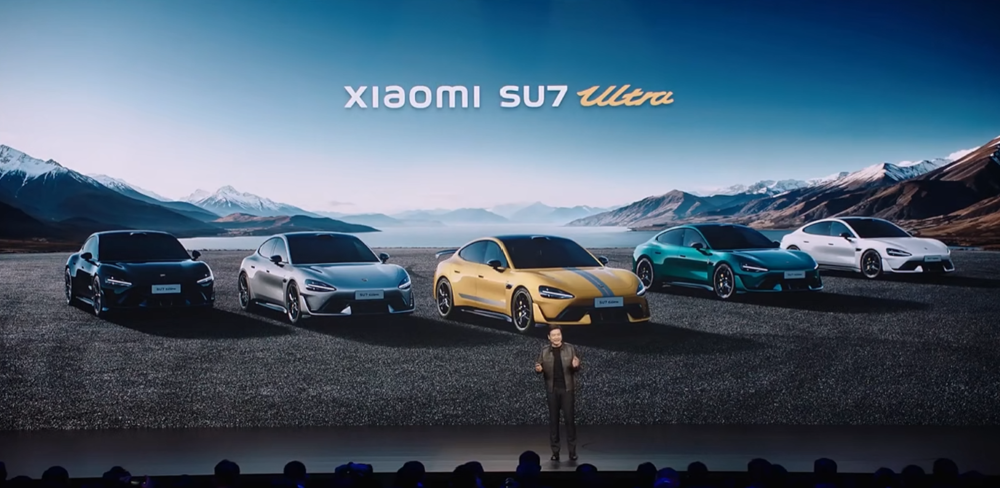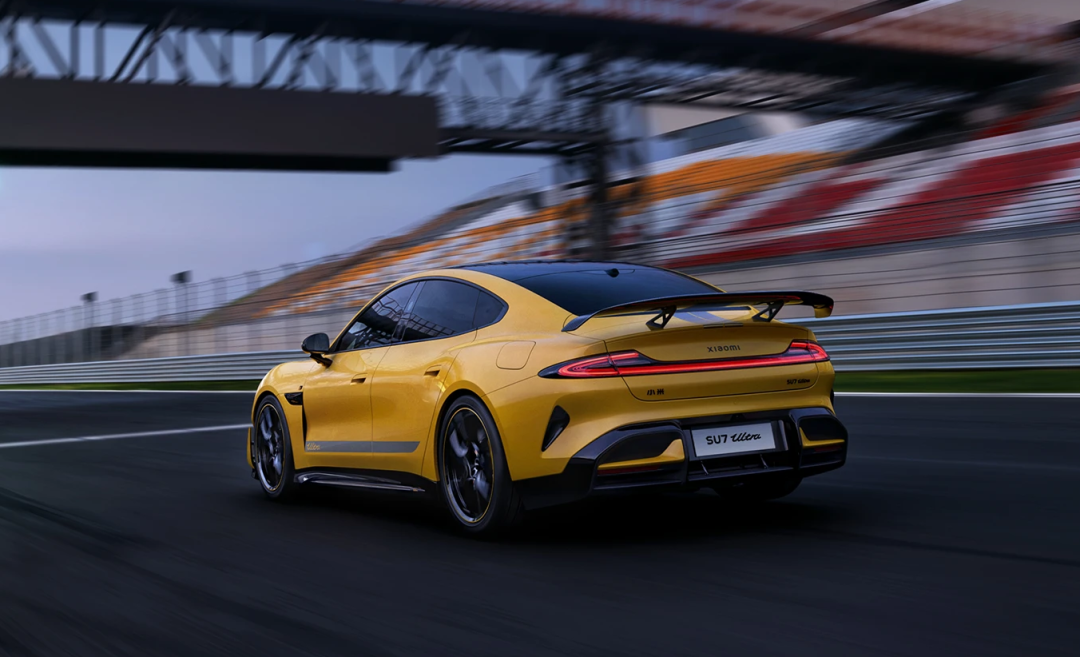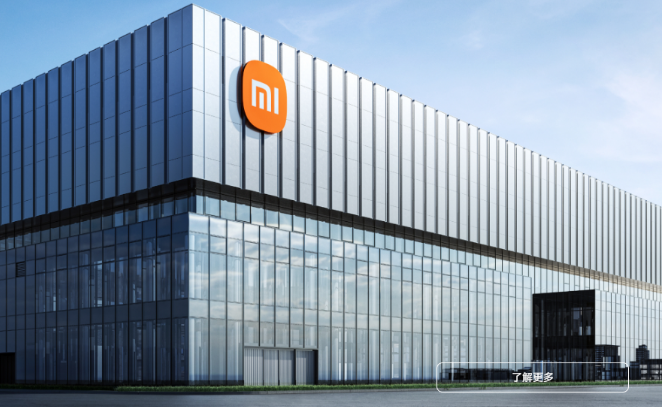- Home
- OFweek News
- Xiaomi SU7 Ultra's Surprise Launch: How Lei Jun's Bold Pricing Strategy Unveils a Global Energy Ecosystem Ambition
Xiaomi SU7 Ultra's Surprise Launch: How Lei Jun's Bold Pricing Strategy Unveils a Global Energy Ecosystem Ambition
Published: February 28, 2025 18:05
Xiaomi SU7 Ultra Launches at Surprisingly Lower Price, Highlighting Lei Jun's Energy Empire Ambitions
February 27th, 2025 - The Xiaomi SU7 Ultra officially launched at a starting price of 529,900 yuan ($73,800), about 300,000 yuan lower than the previously rumored pre-sale price of 820,000 yuan, surprising industry observers. The vehicle comes in three versions: Standard Edition, Racing Package Edition, and Nürburgring Limited Edition. The Nürburgring Limited Edition, priced at 814,900 yuan ($113,500), features "almost identical specifications to the ones we used to challenge the Nürburgring record," according to Xiaomi CEO Lei Jun.

source: Xiaomi
This vehicle represents not just a quantum leap in power performance and battery technology but also reflects Xiaomi's strategic positioning and market ambitions in the premium electric vehicle sector. According to official data, the production version of the SU7 Ultra is equipped with a "dual V8s+V6s three-motor all-wheel drive system," delivering a maximum output of 1,548 horsepower. The vehicle achieves 0-100 km/h acceleration in just 1.98 seconds, 0-200 km/h in 5.86 seconds, and completes the quarter-mile (0-400m) in only 9.23 seconds, with a top speed exceeding 350 km/h.
On the battery technology front, the SU7 Ultra features CATL's Qilin II track-specific high-power battery pack, supporting charge rates up to 5.2C with peak voltage reaching 897 volts. It can charge from 10% to 80% in just 11 minutes, ensuring both extreme performance output and practical range. The synergy between high-speed charging and high-power output satisfies performance driving demands while providing a solid foundation for track-level experiences. Xiaomi's innovations in motor and battery technology demonstrate its leading position in vehicle performance tuning and electronic control system integration. Compared to traditional combustion supercars, this electric vehicle not only offers zero emissions but also showcases superior technological prowess in instantaneous power delivery and responsiveness.
Since the launch of the Xiaomi SU7 in March 2024, its market performance has been closely monitored, becoming a focal point for industry attention. Retail data shows that by the end of 2024, SU7 cumulative sales exceeded 139,000 units, approaching 140,000 units in just eight months on the market—an impressive achievement for a tech company newly entering the automotive industry.
According to Xiaomi's official data, orders for the SU7 Ultra production version exceeded 6,900 units within the first 10 minutes of availability, demonstrating strong consumer demand for high-performance variants. Meanwhile, Xiaomi Group CEO Lei Jun made bold predictions for 2025 market performance during his New Year's livestream, planning to deliver 300,000 new vehicles across all models, with an annual sales target of 10,000 units for the SU7 Ultra. The pre-orders for the SU7 Ultra reflect rapidly growing market demand for high-performance electric vehicles, particularly among younger consumers seeking the perfect blend of technology and performance.

source: Xiaomi
To further expand market share, Xiaomi Automotive plans to successively introduce the YU7 model between June and July. As an "extension product" of the SU7, the YU7 continues the tech-focused and sporty design language of the SU7 but with a "longer and taller" body structure to meet the needs of more market segments.
From Smartphones to Energy Ecosystem: Lei Jun's Wealth Empire
From smartphones to new energy vehicles and now the trillion-yuan energy storage sector, Lei Jun and Xiaomi's investments are weaving an "energy internet" spanning batteries, hydrogen energy, and integrated solar-storage-charging systems. Xiaomi Automotive serves as a catalyst for Lei Jun's wealth. From a financial perspective, Lei Jun's empire stands on three pillars:
- Xiaomi Group (24.2% stake, valued at 341.2 billion yuan): Beyond being a smartphone giant, Xiaomi has achieved explosive growth in the new energy vehicle sector. In 2024, Xiaomi delivered 135,000 SU7 vehicles and aims for 300,000 units in 2025.
- Kingsoft Corporation (44.1 billion yuan): Under AI's influence, office software and cloud computing businesses continue to grow.
- Shunwei Capital (51% stake, over 50 billion yuan): Successfully backing unicorns like ByteDance and NIO, while building a complete supply chain in the energy storage sector.
It's evident that Lei Jun's forward-looking insights into new energy have been the true leverage for his wealth. The most direct manifestation is Xiaomi's entry into the automotive sector—Lei Jun's "final entrepreneurial venture"—which has become the key to his rise to becoming China's wealthiest individual.
Meanwhile, the energy portfolio constructed through strategic investments demonstrates Lei Jun and Xiaomi's foresight. As early as 2020, when the market was still debating whether "energy storage was a false trend," Xiaomi-affiliated capital had quietly invested over 50 billion yuan, mapping out a comprehensive technology matrix from lithium batteries and sodium batteries to hydrogen energy.
Three Strategic Pillars of the Energy Empire
Xiaomi's battery portfolio boasts an impressive lineup. Its investment in Zhongchuang Xinhang (CALB) positions it as China's third-largest power battery manufacturer after CATL and BYD—an "invisible champion" with a 2025 production capacity target of 500 GWh.
Additionally, Xiaomi has invested in Honeycomb Energy, whose energy storage business now covers grid-side and commercial/industrial scenarios, and Welion New Energy, a solid-state battery unicorn valued at 15.7 billion yuan whose semi-solid-state batteries can extend electric vehicle range beyond 1,000 kilometers.
More noteworthy is Xiaomi's sodium battery positioning. Through Shunwei Capital's three consecutive rounds of investment in Jianna Energy, which has already launched thousand-ton production lines and will release sodium batteries for electric bicycles and home storage systems in 2024, Xiaomi demonstrates its comprehensive approach to battery technology.
Furthermore, in the battery cathode materials sector, Xiaomi has invested in Rongtong Technology—one of the world's largest suppliers of lithium iron phosphate materials with planned production capacity of 525,000 tons. For anode materials, Xiaomi has backed Carbon Technology, whose hard carbon materials are key to sodium battery performance breakthroughs. By controlling core materials, Xiaomi is attempting to break the supply chain monopoly held by giants like CATL and LG.
In August 2024, Xiaomi Changjiang Fund invested in Hunan Longshen Hydrogen Energy, officially entering the hydrogen energy sector. This company specializes in PEM electrolysis equipment—the highest technological barrier and most profitable segment of the hydrogen energy industry chain.
Xiaomi's ambitions extend beyond hydrogen production equipment to building a closed-loop ecosystem of "photovoltaic hydrogen production-hydrogen storage-hydrogen fuel cells," aligning perfectly with national long-term hydrogen energy planning.

source: Xiaomi
Ecosystem Synergy: Full-Scenario Deployment
Those familiar with Xiaomi's consumer business know that Xiaomi's approach centers on a "complete ecosystem" concept—deeply integrating with its business operations. In the energy sector, Xiaomi's investments similarly aren't isolated but tightly coupled with existing business lines.
On the consumer side, in 2022, Xiaomi launched the Mi Outdoor Power Supply 1000Pro, using hybrid solid-liquid electrolyte batteries with 1.5-hour fast-charging technology that outperforms traditional brands.
For vehicle-storage integration, the SU7's 101kWh battery pack can reverse-supply power to home energy storage systems at night, effectively turning the car into a "mobile power station."
In grid-level deployment, Xiaomi has invested in Shanghai Kuaibo to build integrated solar-storage-charging stations nationwide, with the first project already operational in Ningde. This full-scenario coverage model makes Xiaomi the only global technology company spanning both consumer and business-side energy storage solutions. "In business model innovation, Xiaomi's greatest characteristic is cross-industry integration," Lei Jun has accurately stated.
Trillion-Yuan Race: Energy Ecosystem Ambitions
In recent years, carbon neutrality policies have continuously fostered trillion-yuan markets. Zhang Jianghong, a committee member of the China Technology Economics Society's Environmental Technology Economics Branch, has predicted that China's new energy storage total power will reach 120 million kilowatts, with total investment approaching 900 billion yuan.
Xiaomi's positioning in sodium batteries and hydrogen energy corresponds precisely to two major national strategic needs: "large-scale long-duration energy storage" and "clean energy consumption."
According to reports, Jianna Energy's sodium batteries are expected to reduce costs below 300 yuan per kilowatt-hour, while Longshen Hydrogen's PEM electrolysis efficiency has exceeded 75%. These technological breakthroughs will release commercial value primarily between 2025-2030.
As these companies realize their commercial potential, Xiaomi's "energy internet" framework is gradually taking shape. When home energy storage, electric vehicles, and smart home devices connect seamlessly through the MIUI system, users can generate electricity with solar panels, store energy with their SU7 batteries, and remotely manage energy via smartphone—this is no longer merely a hardware business but the construction of next-generation energy infrastructure.
It's clear that Lei Jun's ambitions have transcended the scope of business competition.
Epilogue
From smartphone leader to China's wealthiest individual, Lei Jun's rise represents both the crowning achievement of Xiaomi's investment capabilities and a microcosm of China's new energy industry ascendance.
As Lei Jun has stated, "With the upgrade of China's entire manufacturing industry, the next 10 years belong to China. Chinese manufacturing and Chinese brands will become global trends."
As Xiaomi's energy storage portfolio deeply integrates with new energy vehicles, smart homes, and cloud computing, an energy ecosystem supporting Lei Jun's wealth empire is emerging.
